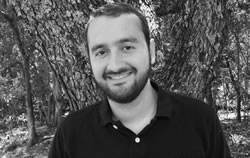|
When I was younger, I did not read much beyond the day's listings in the TV Guide. Of course this changed later, but I still do not consider myself very widely read. At least not like many of my peers who can reach for the nearest book at any library, pull one at random and be somewhat familiar with the author. My handle on writing theorists like Barthes and Burke is shaky at best. I can guarantee that my IQ won't bowl you over. Writers are often asked about their influences. I've tried to think of someone who would sound good, like Hemingway or Toni Morrison. I came up blank. However, I do have an answer that may be too simplistic or appear so sentimental that you disregard this, but I hope you don't. That's my only appeal. Don't write me off just yet.
Nobody has been more responsible for shaping the writer I am than my father. The son of a police officer from a small town in Pakistan, my father came to the United States for post-graduate studies. He stayed and eventually climbed the managerial ladders at Lucent and AT&T, eventually becoming a prospect for several head hunters looking for management expertise. He returns to Pakistan for parts of the year in order to give back in, what I'm sure he would call, "some small way." My father's work ethic has always astounded me. He sometimes took me with him to work, and I remember his inbox was always empty. When a secretary dropped something off, he looked it over as soon as possible. "Don't put off what you can do today for tomorrow," he told me. My father works from sun up to sun down, chasing perfection.
Surviving as an emerging writer means first accepting the aphorism often repeated by successful writers: "You probably won't make a living doing this." We have to accept the endless hours of work even after a story appears finished. I feel a buzz in my fingers when I complete a first draft. But I never submit these beginnings. A standard short story usually takes me months. An editor might reject it for something as small my choice of verb in the opening line. Writing is heavy lifting. This type of work is strenuous. It aches. I strive for the same attitude as my dad. If I put down the pencil, I think of his empty inbox and try not to put off what I can do then for tomorrow. I log hours combing through a story's minutiae until I'm exhausted enough to sleep.
I hear similar advice from other writers. Tim O'Brien has said that he still edits The Things They Carried. That book was a big reason I began writing and a chance to take a class with him was the main reason I chose to apply to Texas State's MFA program. The version I read and believed to be perfect was inferior in Tim's mind. This type of obsessive perfectionism isn't exclusive to writers. An eighty-five-year-old Japanese sushi chef, whose restaurant earned a three star Michelin award, still tries to improve his menu instead of resting on his accomplishments. Though I'm usually the last person to give Brett Favre a compliment, he came back to the NFL—already more accomplished than most—looking for one more title shot when nobody thought his body was up to it. I learned this from my father before I saw it in anybody else.
Others have recognized tenacity as a trait of those who succeed in their field. I don't claim originality for this idea, but I would like to offer another piece of advice to writers. Before you look to your bookshelf, look around you. I learned to love the heavy lifting of writing from my father—the process of getting your hands dirty and working until your brain shuts down. I worry about emulation becoming second-rate imitation, so I don't seek out writing mentors. My father taught me how to be a writer before I was even a reader.
|


